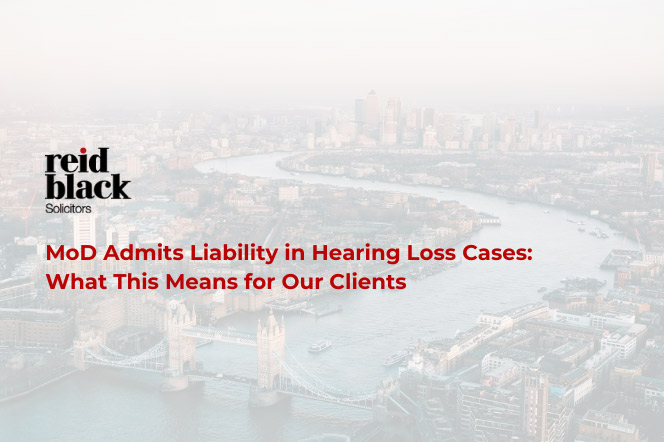Dermatitis Claims Solicitors
Dermatitis Claims Solicitors
If you’re suffering from dermatitis due to working conditions, our specialist solicitors can help you make an occupational dermatitis claim, so you get the compensation you deserve.
- Specialists in Industrial Disease Claims since 1993
- Experience settling claims against major workplaces in Northern Ireland
- Offices in Belfast, Ballyclare and Antrim
- Free consultation to assess your dermatitis claim eligibility
- Transparent legal advice with no hidden fees
What is Occupational Dermatitis?
Dermatitis is a skin condition that causes redness, itching and inflammation, often leading to pain and discomfort. It can result from contact with irritants or allergens and may vary from mild to severe, affecting a person’s ability to carry out daily tasks. In some cases, dermatitis can become chronic, lasting for months or even years if not properly managed.
Occupational dermatitis, also known as industrial dermatitis, occurs when these symptoms are triggered by exposure to hazardous substances in the workplace, such as chemicals, soaps or prolonged contact with water. This condition can severely impact your quality of life, making it difficult to work or even perform basic activities.
Employers have a legal responsibility to minimise these risks by implementing safety measures, providing proper protective equipment, and ensuring a safe working environment to prevent their employees from developing dermatitis.
Symptoms of Occupational Dermatitis
It’s important to pay attention to where dermatitis flares up, as this can help determine if it’s related to your work. Occupational dermatitis commonly affects areas of the body that come into direct contact with irritants, such as the hands, arms, face and neck.
Symptoms of occupational dermatitis can range from mild to severe. They typically appear during or shortly after work, and may improve when away from the workplace.
The most common signs include:
- Redness and Inflammation – The affected skin becomes red, swollen and irritated.
- Itching – Persistent or intense itching which can lead to scratching.
- Dry, Scaly or Cracked Skin – The skin may become dry and start to flake leading to potential infections.
- Blisters or Bumps – Small blisters or raised bumps can form on the skin, which may ooze or crust over.
- Burning or Stinging – Affected areas can feel painful, with sensations of burning or stinging.
- Thickened Skin – Prolonged exposure can cause the skin to thicken or harden.
Causes of Occupational Dermatitis
Occupational dermatitis is generally caused by exposure to irritants or allergens in the workplace, such as certain chemicals, solvents, or repeated wet work. These substances can damage the skin’s protective barrier, leading to inflammation and other symptoms.
Substances that can cause occupational dermatitis include:
- Detergents and Soaps – Common in cleaning, healthcare and food service roles where frequent hand washing or cleaning is required.
- Solvents and Acids – Found in industries like manufacturing, painting and construction, where workers handle chemicals that strip the skin of its natural oils.
- Cement and Wet Concrete – Poses a risk to construction workers who are frequently in contact with wet cement, which can cause both irritation and allergic reactions.
- Oils and Greases – Used in automotive, machinery and engineering settings, prolonged skin contact with these substances can lead to dermatitis.
- Hairdressing Chemicals – Dyes, bleaches and other hair treatment products can cause dermatitis for hairdressers and beauty professionals.
- Latex and Rubber – Common in healthcare and laboratory environments, contact with gloves or other rubber products can trigger allergic dermatitis.
Who Can Make an Occupational Dermatitis Claim in Northern Ireland?
If you have developed dermatitis due to your working conditions in Northern Ireland, you may be eligible to make a claim for compensation. This applies to anyone whose employer has failed to take reasonable steps to protect them from harmful exposure, resulting in dermatitis.
Workers at risk of occupational dermatitis include:
- Healthcare Workers
- Cleaners
- Builders and Construction Workers
- Hairdressers and Beauticians
- Manufacturing and Factory Workers
- Catering and Food Processing Staff
If you are suffering from dermatitis due to employer negligence, you have the right to seek compensation. Employers are required by law to ensure a safe working environment, and failure to do so can make them liable. Even if you only suspect your dermatitis might be work-related, it’s important to get in touch. Our solicitors can help assess your situation, guide you through the claims process, and ensure you receive the compensation you deserve.
Dermatitis Claims Process
We understand making a personal injury claim can be intimidating – that’s why we keep our dermatitis claims process easy and straightforward, with our expert solicitors guiding you every step of the way.
Step 1: Contact Reid Black
Reach out to us for a free consultation to discuss your dermatitis symptoms and how they may be work-related. Our solicitors will assess your case and explain your options for making an occupational dermatitis claim.
Step 2: Gathering Information
Next, we will gather evidence, including work records, photos and witness statements, to support your dermatitis claim. Our team will ensure all necessary documentation is in place to build a strong case.
Step 3: Medical Assessment
Following this, a medical expert will evaluate your dermatitis to confirm the link to your work conditions. Our solicitors will arrange this assessment and ensure the report accurately reflects the impact on your health.
Step 4: Compensation Negotiations
We will negotiate with your employer’s insurance company to secure the maximum compensation for your dermatitis claim. Our solicitors will handle all communications to achieve a fair settlement on your behalf.
Step 5: Compensation Payout
Once an agreement is reached, we will ensure your compensation is paid promptly. Our team will keep you updated throughout and make the process as smooth as possible.
Dermatitis Claim Time Limits
In Northern Ireland, the time limit for making a dermatitis claim is generally three years from when you first noticed your symptoms or realised they were work-related. However, there can be exceptions to this, such as if the symptoms developed gradually or if you were unaware of the link to your workplace.
Even if you think you’ve missed the time limit, it’s important to contact us, as we often take on claims that have been refused by other firms due to misunderstood timelines.
Dermatitis Compensation Claim Amounts
Compensation for dermatitis claims is awarded under two categories: general damages and special damages. General damages compensate for the pain, suffering and loss of quality of life caused by the dermatitis. Special damages cover financial losses such as medical expenses, loss of earnings, and any costs incurred due to your condition.
The amount of compensation you receive will depend on the specific details of your case, making it difficult to predict the exact figure without a full assessment.
However, the general damage guidelines provided by the Green Book offer an estimate for the pain and suffering aspect of your claim but do not reflect the total compensation you could receive, as special damages are unique to each case.
Compensation amounts for dermatosis claims in Northern Ireland:
- Severe Dermatitis: £50,000 – £100,000
For gross cases causing significant pain and discomfort that are likely to continue, severely affecting your ability to work. - Long-Term Rash: £30,000 – £65,000
For rashes covering other parts of the body that last more than three years and may persist. - Primary Irritant Rash: £15,000 – £30,000
For rashes on the hands that clear up or are expected to clear up in 2 to 3 years. - Allergic Rash: £20,000 – £42,500
For allergic rashes similar to primary irritant rashes in duration and impact. - Short-Term Rash: Up to £17,500
For rashes that clear up within a matter of months, with higher awards for cases where regular employment is affected. A minor, non-recurrent, non-itchy rash with no impact on employment may receive up to £3,500.
These amounts are only a guideline, and your actual compensation could be higher or lower depending on your personal circumstances and additional special damages.
Why Choose Reid Black?
For over 15 years we’ve helped working communities across Northern Ireland secure compensation for dermatitis caused by unsafe working conditions. With our extensive experience and expertise in handling dermatitis claims, our friendly and dedicated solicitors provide personalised support every step of the way. We’re committed to achieving the best results for our clients with clear guidance and a focus on your needs.
Our Specialist Dermatitis Claim Solicitors
Our Specialist Dermatitis Claim Solicitors

- David specialises in personal injury claims, with a focus on industrial disease claims and noise induced hearing loss claims.
- He has over 18 years legal experience, bringing claims against negligent workplaces throughout Northern Ireland.
- Contact David for a no obligation discussion to see if you're eligible to make an occupational dermatitis claim.
- You always get 100% of the compensation, we only seek our costs from the other side and take nothing from you.

- Danielle specialises in industrial disease claims, including Industrial Skin Disease Claims and Occupational Dermatitis Claims.
- She provides a free consultation to discuss if you have a case to bring on a no obligation basis.
- She can arrange a specialist to assess the extent and cause of your dermatitis.
- You receive 100% of the compensation awarded to you, we will not deduct any legal fees.
Frequently Asked Questions
We’re Here To Take Care Of Your Dermatitis Claim
Contact us today for a free consultation to see if you’re eligible to make a dermatitis claim and secure the compensation you deserve.
News
PSNI Data Breach: There’s Still Time to Register Your Claim
The recent PSNI data breach has caused widespread concern among affected individuals. If you believe your data has been compromised, you can still take...
MOD Admits Liability in Noise-Induced Hearing Loss Cases: What This Means for Our Clients
Recently, headlines have been filled with news about the Ministry of Defence (MOD) admitting liability in noise-induced hearing loss (NIHL) cases following a group...
PSNI Data Breach Cases Update – September 2024
This matter was listed before the High Court Judge for Review on Tuesday 24th September 2024. Following several meetings and negotiations with the legal...
























